13 Health Benefits Of Intermittent Fasting You Must Know
Taking long breaks between meals can provide the boost your well-being requires.
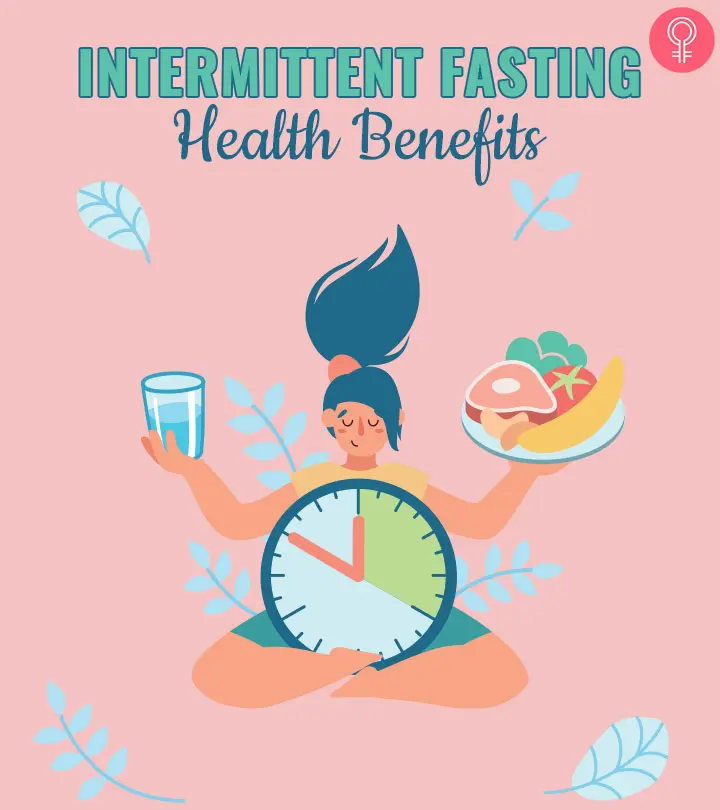
Image: Shutterstock
Intermittent fasting has many benefits. First, it is good for weight loss. Second, it can help reduce the risk of many chronic diseases. Whether you choose to go on the 8-hour intermittent fasting routine every day or the 5:2 intermittent fasting every week, here are the 13 health benefits of intermittent fasting you can expect. Read on to know how IF can help you lose weight and stay healthy. Scroll down!
 Did You Know?
Did You Know?In This Article
13 Health Benefits of Intermittent Fasting
Knowing what intermittent fasting is and how it works is the best way to reap its benefits. Tracking your mealtimes and sticking to your fasting phase is believed to allow you to make the most of this practice.
1. Intermittent Fasting Can Lower Diabetes Risk

Diabetes affects about 463 million adults, 1.1 million children and adolescents, and 20 million live births in the world (2019 statistics) (1).
Diabetes may occur if the body fails to create insulin (type 1 diabetes) or becomes insulin resistant (type 2 diabetes) (2). Intermittent fasting is an effective strategy to reverse insulin resistance in people with type 2 diabetes.
According to a cross-sectional study that included 2,483 participants on the effects of intermittent fasting (IF) and non-intervention diet on insulin concentrations, IF could reduce insulin resistance compared with the non-intervention diet with a standard mean difference of 0.21 between the results of the two groups.
A small study of three people with type 2 diabetes had the people fast for 24 hours, three times a week. After the end of about seven months, all of them had better blood sugar control, weight, and waist circumference (3).
The Journal of Applied Physiology published a study to monitor the effect of intermittent fasting on people with type 2 diabetes. The scientists concluded that intermittent fasting increased insulin actionsevenfold and reduced blood glucose levels in the test subjects (4).
Furthermore, a study on diabetic rats showed that intermittent fasting improved glucose homeostasis (maintaining blood glucose levels) (5).
Another study concludes that intermittent fasting may be safe and tolerable in people with type 2 diabetes (6). Talk to your doctor before trying intermittent fasting if you have diabetes.
2. Intermittent Fasting May Improve Heart Health

Heart disease is the leading cause of death (7). Poor diet and lifestyle choices are major causes of poor heart health. Intermittent fasting can helplower the risk of cardiovascular diseases.
It does this by lowering LDL cholesterol, reducing abdominal fat, decreasing leptin (the hunger hormone) concentration, and improving blood lipid profile (8), (9).
A study published in the American Journal of Cardiology shows that people who fast intermittently have a reduced risk of coronary artery disease (10). Intermittent fasting also can help improve cardiac function and potentially reverse cardiomyopathyi A disease that affects the heart muscle and makes it tough for the heart to pump blood to the body, leading to heart failure. in mice studies (11).
Another study showed that intermittent fasting improved the survival rate of rats with chronic heart failure (12). More human studies need to be done to confirm such findings hold true in humans.
3. Intermittent Fasting Reduces Oxidative Stress
Oxidative stress is the build-up of harmful free oxygen radicals in the body. It occurs due to increased metabolic by-products in the body, dead cells, pollutants, and radiation (13).
Antioxidant enzymes, like superoxide dismutase, catalase, and glutathione, help reduce oxidative stress. Researchers have found that intermittent fasting can increase antioxidant enzyme levels in people with obesity (14).
Studies show that intermittent fasting increases the level of glutathione and genes that reduce oxidative stress in lab animals (15), (16). Alternate day fasting in overweight adults showed a decrease in oxidative stress levels (17). Decreased oxidative stress, in turn, can help improve heart health and the risk of the following diseases.
4. Intermittent Fasting May Lower Cancer Risk
Cancer is the second leading cause of death. Chemotherapy, surgery, and novel strategies can help manage cancer.
New findings show that intermittent fasting without reducing calorie intake is a potential strategy to treat and prevent cancer (18). Fasting alters the growth factor, which affects the cancer cells’ ability to grow and thrive (19).
Women who fasted in the night showed reduced breast cancer risk in one study (20). Another study concluded that intermittent fasting could help people tolerate chemotherapy better (21).
Intermittent fasting also promotes autophagy (clearing dead cells), which can help reduce tumor cells and increase the effectiveness of radio and chemotherapy (22).
A comparative study on mice on a calorie-restricted diet and intermittent fasting stated that the intermittent fasting showed anti-cancer effects (23). However, more research is needed to determine the safety of intermittent fasting on people with cancer and/or undergoing chemotherapy (24).
5. Intermittent Fasting May Help Reduce Blood Pressure

High blood pressure or hypertension is a common genetic and/or lifestyle-related non-communicable disease. Intermittent fasting helps lower blood pressure (25), (26).
Women aged 46-62 years showed a decrease in systolic and diastolic blood pressure (27). Time-restricted intermittent fasting improved insulin sensitivity and helped lower blood pressure in men with pre-diabetes (28).
6. Intermittent Fasting May Help Prevent Alzheimer’s
Alzheimer’s is a neurodegenerative disease that causes memory loss. Intermittent fasting is emerging as an effective nutritional approach to promote the brain’s ability to restructure its function and prevent memory loss (29).
Along with medication and workout, intermittent fasting can be used as a preventive strategy for Alzheimer’s disease (30).
A 4-week rat study showed that intermittent fasting may help prevent memory loss and improve energy (31). Another study on mice concludes that intermittent fasting restores cell membrane protein polarity, which is beneficial for reducing the risk of Alzheimer’s (32).
7. Intermittent Fasting Can Reduce Inflammation
Inflammation is the first step to healing. But chronic inflammation can lead to obesity, diabetes, cancer, arthritis, heart disease, stroke, etc. (33). Intermittent fasting increases adiponectin, a hormone that reduces inflammation (34).
Scientists also found that during Ramadan, people practicing intermittent fasting had fewer pro-inflammatoryi Substances or foods (like certain nuts and fruits) that encourage or can trigger inflammation. molecules that helped control body weight (35). Intermittent fasting also helped retain muscle mass and reduced inflammation in resistance-trained males (36).
Researchers studied the effects of intermittent fasting on mice. They found that intermittent fasting had an anti-inflammatory effect on the neuroimmune systemi Components of the nervous and immune systems that work together to protect nerve cells from pathogens. (37). This dietary strategy also reduced inflammatory markers in mice liver and preserved brain and cognitive functions (38), (39).
8. Intermittent Fasting Promotes Autophagy
Autophagy is the removal of damaged cells, proteins, organelles. It occurs in response to toxin build-up and DNA damage. The inhibition of autophagy leads to DNA instability, inflammation, and diseases (40).
Intermittent fasting has shown to improve autophagy, which prevents tumor cell growth and increases chemotherapy tolerance (22). Autophagy is beneficial for various types of cancers, like breast cancer, leukemia, ovarian cancer, prostate cancer, myeloma, etc. (41).
Short-term fasting also enhances therapeutic neuronal autophagy (42). You may also practice an 8-hour diet or 16-hour diet under intermittent fasting as it can help enhance autophagy. A study on mice shows that intermittent fasting-induced autophagy decreases fat, prevents obesity, lowers lipid levels, and enhances muscle mass (43).
9. Intermittent Fasting May Help Reduce Belly Fat

Intermittent fasting is a popular method to help people lose weight (44). It can lower LDL cholesterol and BMI in some people and has also been found to help reduce belly fat (45).
Scientists have found that intermittent fasting results in lower waist circumference as compared to regimens of people on a calorie-restricted diet (46). Combining intermittent fasting with the Mediterranean diet also resulted in lower abdominal fat in East Asian Americans in a study (47).
Another study on people with obesity confirms that intermittent fasting can help reduce waist circumference, fat, and free fat mass (48).
Chris Lowe, a blogger, shared how he benefited from intermittent fasting in his weight loss journey: “Bodyweight dropped from 92 kg at approx. 20% body fat (just guessing as I didn’t get it measured at the time) to 72 kg at approx. 6-7% body fat. Basically, I went from being fat to being very lean, all in 16 weeks (i).”
10. Intermittent Fasting May Improve Sleep Quality
Not being able to sleep at night or staying asleep (insomnia) is a sleep disorder. It can increasethe risk of various diseases and impact mental health (49). Fasting intermittently has shown to improve the quality of sleep in people with obesity (50).
A study concludes that Ramadan fasting increases daytime sleep (51). Researchers have found that fasting increases alertness but also helps increase sleep time (52). However, more controlled human studies with larger samples are required.
11. Intermittent Fasting Can Help Maintain Muscle Mass
Every year, after the age of 30, muscle loss increases to about 1% of muscle mass per year (53). The mitochondriai Cell organelle that produces the energy required to drive chemical reactions within the cell. in the muscles help maintain metabolic health (54). Muscle loss, in turn, slows down metabolism and can lead to age-related obesity (55).
Fasting intermittently can help preserve lean muscle (56). However, it is recommended to include resistance training in the workout regimen to lose fat and retain lean muscle while doing intermittent fasting (57).
12. Intermittent Fasting May Increase Longevity
Intermittent fasting can promote healthy aging (58). This, in turn, can increase longevity. It is a scientific functional aging nutritional strategy that induces autophagy (removal of cellular waste), helps with cellular repair, may improve heart health, reduces inflammation, regulates blood pressure, helps reduce the risk of various types of cancer, prevent Alzheimer’s and dementia, and is good for people with type 2 diabetes (3), (8), (9), (18), (22), (25), (59), (60). In turn, such health benefits can increase the chances of one living a long, healthy life.
13. Intermittent Fasting May Help Manage Polycystic Ovarian Syndrome (PCOS)
Intermittent fasting has gained attention as a potential approach for managing Polycystic Ovary Syndrome (PCOS). Studies suggest that intermittent fasting may aid weight loss and regulate menstrual cycles in women with PCOS. By cycling between periods of fasting and eating, this time-restricted-eating plan may boost weight loss, improve insulin sensitivity and menstruation, and reduce chronic inflammation and hyperandrogenemia (excess male hormones), which are common issues associated with PCOS (61). However, the effectiveness of this fasting plan varies among individuals. It is essential for women with PCOS to consult a healthcare professional before starting any fasting regimen. Proper guidance can ensure personalized and safe practices, addressing individual health needs while managing PCOS symptoms effectively.
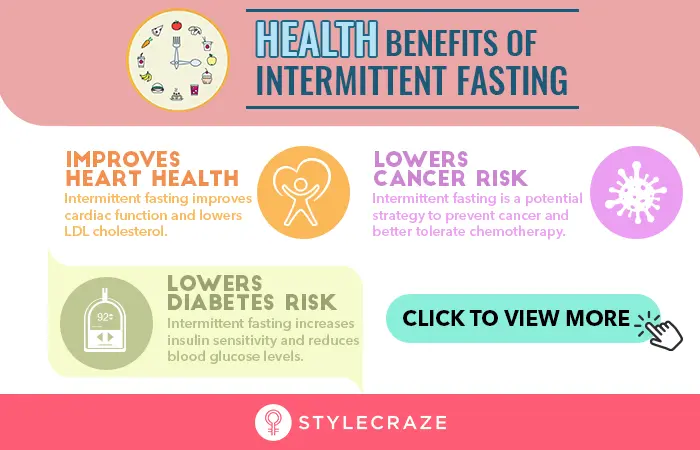
Conclusion
Intermittent fasting is not a fad method for weight loss. It is scientifically proven to aid weight loss and improve health. However, it may not be a safe health solution for everyone, so be sure to talk to your doctor to know if you should fast intermittently and if so, how often in a week you should do it.
 Quick Tip
Quick TipThe benefits of intermittent fasting are gaining more and more attention nowadays. It can improve the immune system, cardiovascular health and reduce diabetes risk, oxidative stress, cancer risk, and blood pressure. It can also help with disease prevention like Alzheimer’s, reduce belly fat, improve sleep quality, help maintain muscle mass, and increase longevity. There are various ways to practice intermittent fasting. However, it may not be suitable for everyone. Hence, consult your doctor before choosing intermittent fasting for weight loss. Also, know how many times you can do it in a week.
Frequently Asked Questions
Can I drink coffee while intermittent fasting?
You may have black coffee in moderation, without any added ingredients.
Can intermittent fasting help lose weight without exercise?
You can lose weight on intermittent fasting even if you don’t exercise. However, if you add exercise, it ensures you lose more fat weight rather than muscle mass.
Is it OK to skip breakfast in intermittent fasting?
Ideally, with the 16-hour intermittent fasting, you are encouraged to skip breakfast. However, it also depends on the schedule you follow.
Key Takeaways
- Intermittent fasting improves heart health by lowering LDL cholesterol levels.
- Intermittent fasting can help you manage type 2 diabetes by reversing insulin resistance.
- It also reduces cancer risk by promoting a process called autophagy (clearing dead cells), which helps to reduce tumor cells.
Illustration: Health Benefits Of Intermittent Fasting You Must Know
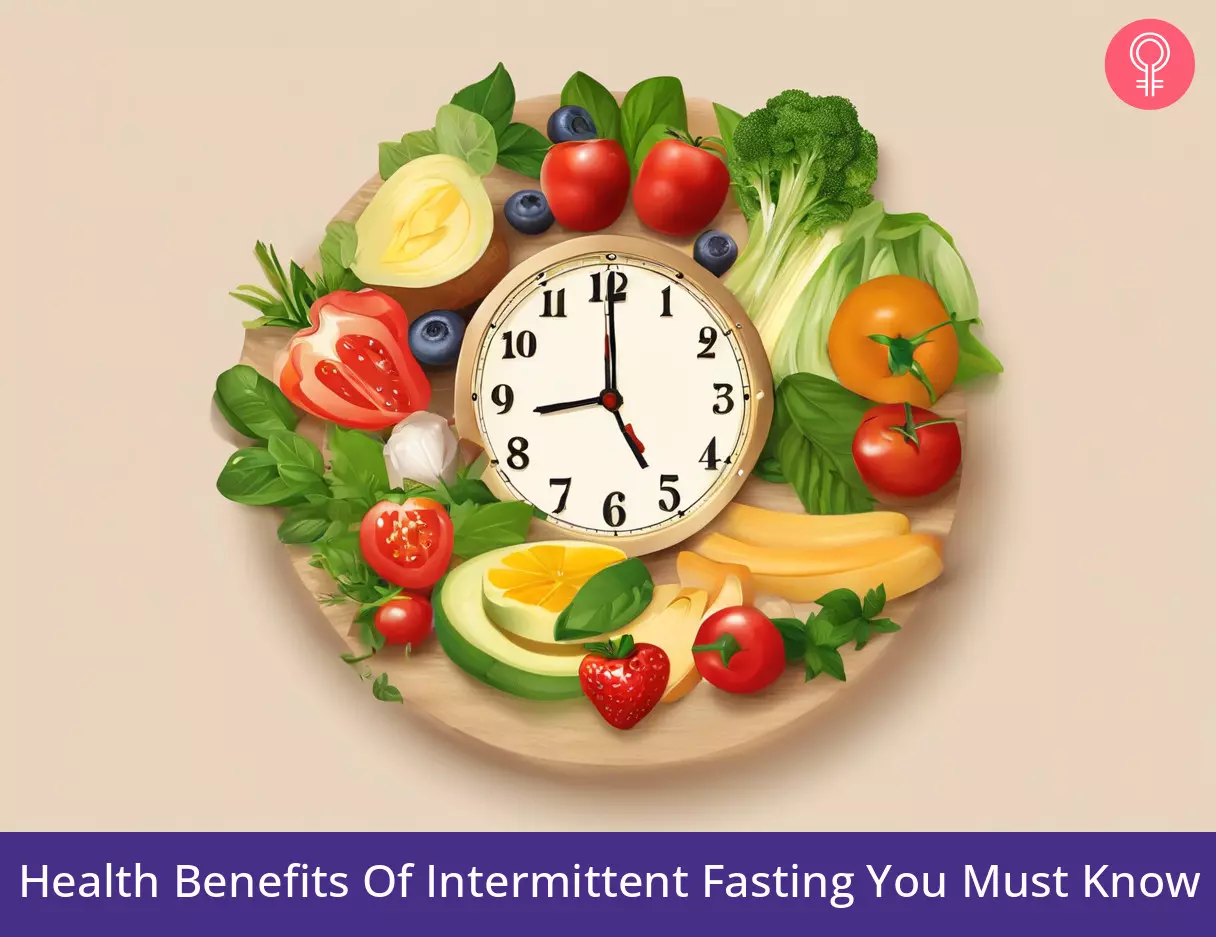
Image: Stable Diffusion/StyleCraze Design Team
Intermittent fasting may have health benefits beyond weight loss. With the following video, discover how this popular diet can help improve your overall health and well-being.
Personal Experience: Source
StyleCraze's articles are interwoven with authentic personal narratives that provide depth and resonance to our content. Below are the sources of the personal accounts referenced in this article.
i. EXPERIENCES WITH INTERMITTENT FASTING: PART Ihttps://chrisloweblog.wordpress.com/2014/03/23/experiences-with-intermittent-fasting-part-i/
References
Articles on StyleCraze are backed by verified information from peer-reviewed and academic research papers, reputed organizations, research institutions, and medical associations to ensure accuracy and relevance. Read our editorial policy to learn more.
- Diabetes facts & figures, International Diabetes Federation.
https://idf.org/about-diabetes/diabetes-facts-figures/ - What is Diabetes? National Institute of Diabetes and Digestive and Kidney Diseases.
https://www.niddk.nih.gov/health-information/diabetes/overview/what-is-diabetes - Therapeutic use of intermittent fasting for people with type 2 diabetes as an alternative to insulin, BMJ Case Reports, US National Library of Medicine, National Institutes of Health.
https://www.ncbi.nlm.nih.gov/pmc/articles/PMC6194375/ - Effect of intermittent fasting and refeeding on insulin action in healthy men, Journal of Applied Physiology, American Physiological Society.
https://journals.physiology.org/doi/full/10.1152/japplphysiol.00683.2005 - Comparison of glycemic improvement between intermittent calorie restriction and continuous calorie restriction in diabetic mice, Nutrition & Metabolism, US National Library of Medicine, National Institutes of Health.
https://www.ncbi.nlm.nih.gov/pmc/articles/PMC6714240/ - Effects of intermittent fasting on health markers in those with type 2 diabetes: A pilot study, World Journal of Diabetes, US National Library of Medicine, National Institutes of Health.
https://www.ncbi.nlm.nih.gov/pmc/articles/PMC5394735/ - Heart Disease Facts, Centers for Disease Control and Prevention.
https://www.cdc.gov/heart-disease/data-research/facts-stats/?DC_AAref_Val=https://www.cdc.gov/heartdisease/facts.htm - Intermittent Fasting in Cardiovascular Disorders—An Overview, Nutrients, US National Library of Medicine, National Institutes of Health
https://www.ncbi.nlm.nih.gov/pmc/articles/PMC6471315/ - Impact of intermittent fasting on the lipid profile: Assessment associated with diet and weight loss, Clinical Nutrition ESPEN, US National Library of Medicine, National Institutes of Health.
https://pubmed.ncbi.nlm.nih.gov/29576352 - Usefulness of routine periodic fasting to lower risk of coronary artery disease in patients undergoing coronary angiography, The American Journal of Cardiology, US National Library of Medicine, National Institutes of Health.
https://www.ncbi.nlm.nih.gov/pmc/articles/PMC2572991/ - Intermittent Fasting Reverses an Advanced Form of Cardiomyopathy, Journal of the American Heart Association, US National Library of Medicine, National Institutes of Health.
https://www.ncbi.nlm.nih.gov/pmc/articles/PMC6405682/ - Chronic intermittent fasting improves the survival following large myocardial ischemia by activation of BDNF/VEGF/PI3K signaling pathway, Journal of Molecular and Cellular Cardiology, US National Library of Medicine, National Institutes of Health.
https://pubmed.ncbi.nlm.nih.gov/19059263 - Oxidative Stress: Harms and Benefits for Human Health, Oxidative Medicine and Cellular Longevity, Hindawi.
https://www.hindawi.com/journals/omcl/2017/8416763/ - Ramadan diurnal intermittent fasting modulates SOD2, TFAM, Nrf2, and sirtuins (SIRT1, SIRT3) gene expressions in subjects with overweight and obesity, Diabetes Research and Clinical Practice, US National Library of Medicine, National Institutes of Health.
https://pubmed.ncbi.nlm.nih.gov/31356832 - Practicality of intermittent fasting in humans and its effect on oxidative stress and genes related to aging and metabolism, Rejuvenation Research, US National Library of Medicine, National Institutes of Health.
https://www.ncbi.nlm.nih.gov/pmc/articles/PMC4403246/ - The effects of dietary restriction on oxidative stress in rodents, Free Radical Biology & Medicine, US National Library of Medicine, National Institutes of Health.
https://www.ncbi.nlm.nih.gov/pmc/articles/PMC4017324/ - Alternate day calorie restriction improves clinical findings and reduces markers of oxidative stress and inflammation in overweight adults with moderate asthma, Free Radical Biology & Medicine, US National Library of Medicine, National Institutes of Health.
https://www.ncbi.nlm.nih.gov/pmc/articles/PMC1859864/ - Fasting and Caloric Restriction in Cancer Prevention and Treatment, Recent results in cancer research. Fortschritte der Krebsforschung. Progres dans les recherches sur le cancer, US National Library of Medicine, National Institutes of Health.
https://pubmed.ncbi.nlm.nih.gov/27557543 - Fasting and cancer: molecular mechanisms and clinical application. Nature Reviews, US National Library of Medicine, National Institutes of Health.
https://www.ncbi.nlm.nih.gov/pmc/articles/PMC6938162/ - Prolonged Nightly Fasting and Breast Cancer Prognosis, JAMA Oncology, US National Library of Medicine, National Institutes of Health.
https://www.ncbi.nlm.nih.gov/pmc/articles/PMC4982776/ - The effects of short-term fasting on quality of life and tolerance to chemotherapy in patients with breast and ovarian cancer: a randomized cross-over pilot study, BMC Cancer, US National Library of Medicine, National Institutes of Health.
https://www.ncbi.nlm.nih.gov/pmc/articles/PMC5921787/ - Autophagy and intermittent fasting: the connection for cancer therapy? Clinics, US National Library of Medicine, National Institutes of Health.
https://www.ncbi.nlm.nih.gov/pmc/articles/PMC6257056/ - Effect of Intermittent versus Chronic Calorie Restriction on Tumor Incidence: A Systematic Review and Meta-Analysis of Animal Studies, Scientific Reports, US National Library of Medicine, National Institutes of Health.
https://www.ncbi.nlm.nih.gov/pmc/articles/PMC5031958/ - Effects of short-term fasting on cancer treatment, Journal of Experimental & Clinical Cancer Research, US National Library of Medicine, National Institutes of Health.
https://www.ncbi.nlm.nih.gov/pmc/articles/PMC6530042/ - The effect of intermittent fasting on blood pressure variability in patients with newly diagnosed hypertension or prehypertension, Journal of the American Society of Hypertension, US National Library of Medicine, National Institutes of Health.
https://pubmed.ncbi.nlm.nih.gov/29275920 - Recurrent circadian fasting (RCF) improves blood pressure, biomarkers of cardiometabolic risk and regulates inflammation in men, Journal of Translational Medicine, US National Library of Medicine, National Institutes of Health.
https://www.ncbi.nlm.nih.gov/pmc/articles/PMC6700786/ - Acute effects of short-term fasting on blood pressure, circulating noradrenaline and efferent sympathetic nerve activity, Acta medica Scandinavica, US National Library of Medicine, National Institutes of Health.
https://pubmed.ncbi.nlm.nih.gov/3389203 - Early Time-Restricted Feeding Improves Insulin Sensitivity, Blood Pressure, and Oxidative Stress Even without Weight Loss in Men with Prediabetes, Cell Metabolism, US National Library of Medicine, National Institutes of Health.
https://pubmed.ncbi.nlm.nih.gov/29754952 - Nutrients in the Prevention of Alzheimer’s Disease, Oxidative Medicine and Cellular Longevity, US National Library of Medicine, National Institutes of Health.
https://www.ncbi.nlm.nih.gov/pmc/articles/PMC6746160/ - How the evidence stacks up for preventing Alzheimer’s disease, Nature.
https://idp.nature.com/authorize?response_type=cookie&client_id=grover&redirect_uri=https%3A%2F%2Fwww.nature.com%2Farticles%2Fd41586-018-05724-7 - Intermittent fasting protects against the deterioration of cognitive function, energy metabolism and dyslipidemia in Alzheimer’s disease-induced estrogen deficient rats, Experimental Biology and Medicine, US National Library of Medicine, National Institutes of Health.
https://pubmed.ncbi.nlm.nih.gov/29307281 - Intermittent Fasting Protects against Alzheimer’s Disease Possible through Restoring Aquaporin-4 Polarity, Frontiers in Molecular Neuroscience, US National Library of Medicine, National Institutes of Health.
https://www.ncbi.nlm.nih.gov/pmc/articles/PMC5712566/ - Understanding inflammation, its regulation, and relevance for health: a top scientific and public priority, Brain, Behavior, and Immunity, US National Library of Medicine, National Institutes of Health.
https://www.ncbi.nlm.nih.gov/pmc/articles/PMC4361086/ - The role of inflammatory markers following Ramadan Fasting, Pakistan Journal of Medical Sciences, US National Library of Medicine, National Institutes of Health.
https://www.ncbi.nlm.nih.gov/pmc/articles/PMC6408667/ - Intermittent fasting during Ramadan attenuates proinflammatory cytokines and immune cells in healthy subjects, Nutrition Research, US National Library of Medicine, National Institutes of Health.
https://pubmed.ncbi.nlm.nih.gov/23244540 - Effects of eight weeks of time-restricted feeding (16/8) on basal metabolism, maximal strength, body composition, inflammation, and cardiovascular risk factors in resistance-trained males, Journal of Translational Medicine, US National Library of Medicine, National Institutes of Health.
https://www.ncbi.nlm.nih.gov/pmc/articles/PMC5064803/ - Fasting induces an anti-inflammatory effect on the neuroimmune system which a high-fat diet prevents, Obesity, US National Library of Medicine, National Institutes of Health.
https://www.ncbi.nlm.nih.gov/pmc/articles/PMC3695639/ - Flipping the Metabolic Switch: Understanding and Applying the Health Benefits of Fasting, Obesity, US National Library of Medicine, National Institutes of Health.
https://www.ncbi.nlm.nih.gov/pmc/articles/PMC5783752/ - Intermittent fasting could ameliorate cognitive function against distress by regulation of inflammatory response pathway, Journal of Advanced Research, US National Library of Medicine, National Institutes of Health.
https://www.ncbi.nlm.nih.gov/pmc/articles/PMC5608558/ - Repair, Reuse, Recycle: The Expanding Role of Autophagy in Genome Maintenance, Trends in Cell Biology, US National Library of Medicine, National Institutes of Health.
https://www.cell.com/trends/cell-biology/pdf/S0962-8924(16)30209-4.pdf - Autophagy and intermittent fasting: the connection for cancer therapy? Clinics, US National Library of Medicine, National Institutes of Health.
https://www.ncbi.nlm.nih.gov/pmc/articles/PMC6257056/ - Short-term fasting induces profound neuronal autophagy, Autophagy, US National Library of Medicine, National Institutes of Health.
https://www.ncbi.nlm.nih.gov/pmc/articles/PMC3106288/ - System-wide Benefits of Intermeal Fasting by Autophagy, Cell Metabolism, US National Library of Medicine, National Institutes of Health.
https://www.ncbi.nlm.nih.gov/pmc/articles/PMC5718973/ - Intermittent Fasting: The Choice for a Healthier Lifestyle, Cureus, US National Library of Medicine, National Institutes of Health.
https://www.ncbi.nlm.nih.gov/pmc/articles/PMC6128599/ - Potential Benefits and Harms of Intermittent Energy Restriction and Intermittent Fasting Amongst Obese, Overweight and Normal Weight Subjects-A Narrative Review of Human and Animal Evidence, Behavioral Sciences, US National Library of Medicine, National Institutes of Health.
https://www.ncbi.nlm.nih.gov/pmc/articles/PMC5371748/ - Intermittent Dieting: Theoretical Considerations for the Athlete, Sports, US National Library of Medicine, National Institutes of Health.
https://www.ncbi.nlm.nih.gov/pmc/articles/PMC6359485/ - Effects of Intermittent Energy Restriction Combined with a Mediterranean Diet on Reducing Visceral Adiposity: A Randomized Active Comparator Pilot Study, Nutrients, US National Library of Medicine, National Institutes of Health.
https://www.ncbi.nlm.nih.gov/pmc/articles/PMC6627434/ - Intermittent fasting interventions for treatment of overweight and obesity in adults: a systematic review and meta-analysis, JBI database of Systematic Reviews and Implementation Reports, US National Library of Medicine, National Institutes of Health.
https://pubmed.ncbi.nlm.nih.gov/29419624/ - Extent and Health Consequences of Chronic Sleep Loss and Sleep Disorders, Sleep Disorders and Sleep Deprivation: An Unmet Public Health Problem, US National Library of Medicine, National Institutes of Health.
https://www.ncbi.nlm.nih.gov/books/NBK19961/ - Effects of short-term modified fasting on sleep patterns and daytime vigilance in non-obese subjects: results of a pilot study, Annals of Nutrition & Metabolism, US National Library of Medicine, National Institutes of Health.
https://pubmed.ncbi.nlm.nih.gov/12748412 - Effect of diurnal fasting on sleep during Ramadan: a systematic review and meta-analysis, Sleep & breathing = Schlaf & Atmung, US National Library of Medicine, National Institutes of Health
https://pubmed.ncbi.nlm.nih.gov/31832984 - Fasting, Circadian Rhythms, and Time-Restricted Feeding in Healthy Lifespan, Cell Metabolism, US National Library of Medicine, National Institutes of Health.
https://www.ncbi.nlm.nih.gov/pmc/articles/PMC5388543/ - Age-related and disease-related muscle loss: the effect of diabetes, obesity, and other diseases, The Lancet. Diabetes & Endocrinology, US National Library of Medicine, National Institutes of Health.
https://www.ncbi.nlm.nih.gov/pmc/articles/PMC4156923/ - The role of mitochondria in health and disease, Current Opinion in Pharmacology, US National Library of Medicine, National Institutes of Health.
https://www.ncbi.nlm.nih.gov/pmc/articles/PMC3951182/ - Aging, Basal Metabolic Rate, and Nutrition, Japanese Journal of Geriatrics, US National Library of Medicine, National Institutes of Health.
https://pubmed.ncbi.nlm.nih.gov/8361073 - Fasting for weight loss: an effective strategy or latest dieting trend? International Journal of Obesity, US National Library of Medicine, National Institutes of Health.
https://pubmed.ncbi.nlm.nih.gov/25540982 - Effects of intermittent fasting on markers of body composition and mood state, Journal of the International Society of Sports Nutrition, US National Library of Medicine, National Institutes of Health.
https://www.ncbi.nlm.nih.gov/pmc/articles/PMC4271606/ - Fasting or caloric restriction for healthy aging, Experimental Gerontology, US National Library of Medicine, National Institutes of Health.
https://www.ncbi.nlm.nih.gov/pmc/articles/PMC3919445/ - Emerging Anti-Aging Strategies – Scientific Basis and Efficacy, Aging and Disease, US National Library of Medicine, National Institutes of Health.
https://www.ncbi.nlm.nih.gov/pmc/articles/PMC6284760/ - Promoting health and longevity through diet: from model organisms to humans, Cell, US National Library of Medicine, National Institutes of Health.
https://www.ncbi.nlm.nih.gov/pmc/articles/PMC4547605/ - Eight-hour time-restricted feeding improves endocrine and metabolic profiles in women with anovulatory polycystic ovary syndrome
https://pubmed.ncbi.nlm.nih.gov/33849562/
Read full bio of Dr. Stacy Marie Chimento
Read full bio of Ravi Teja Tadimalla
Read full bio of Sindhu Koganti







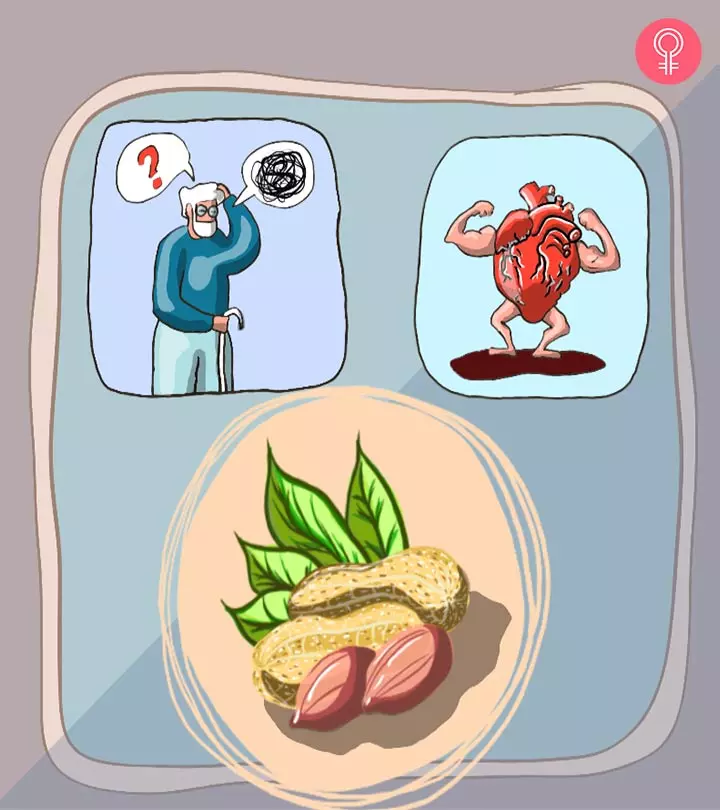
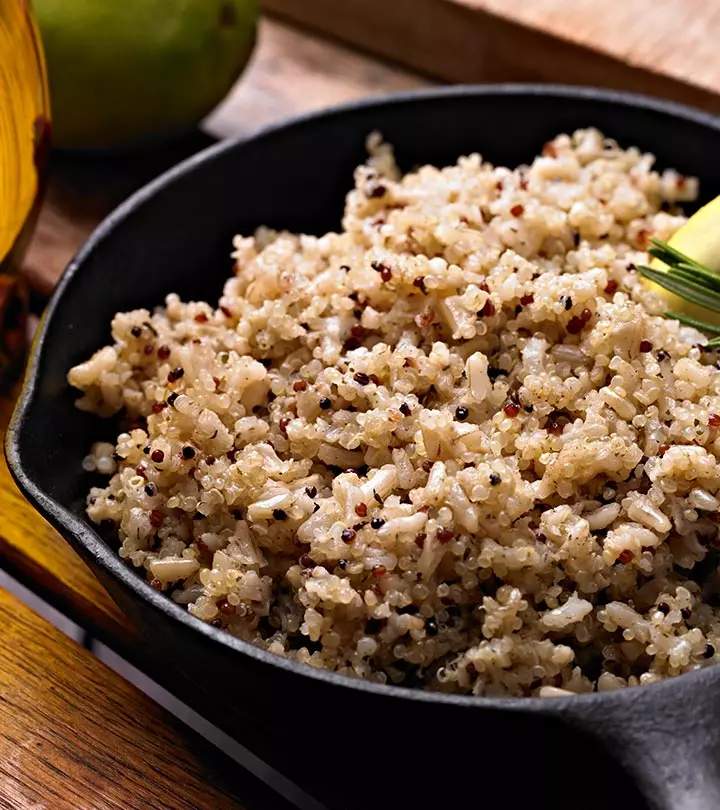


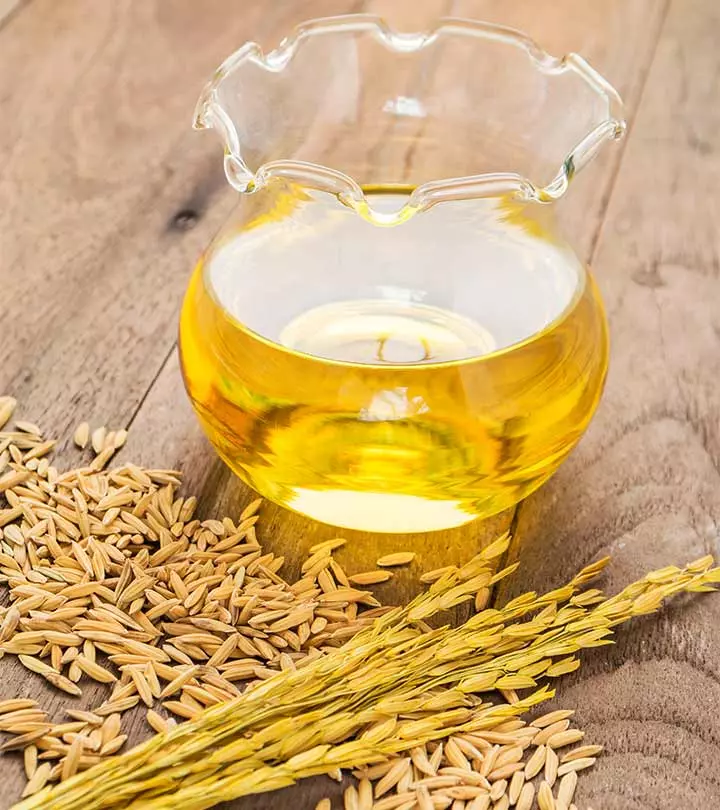

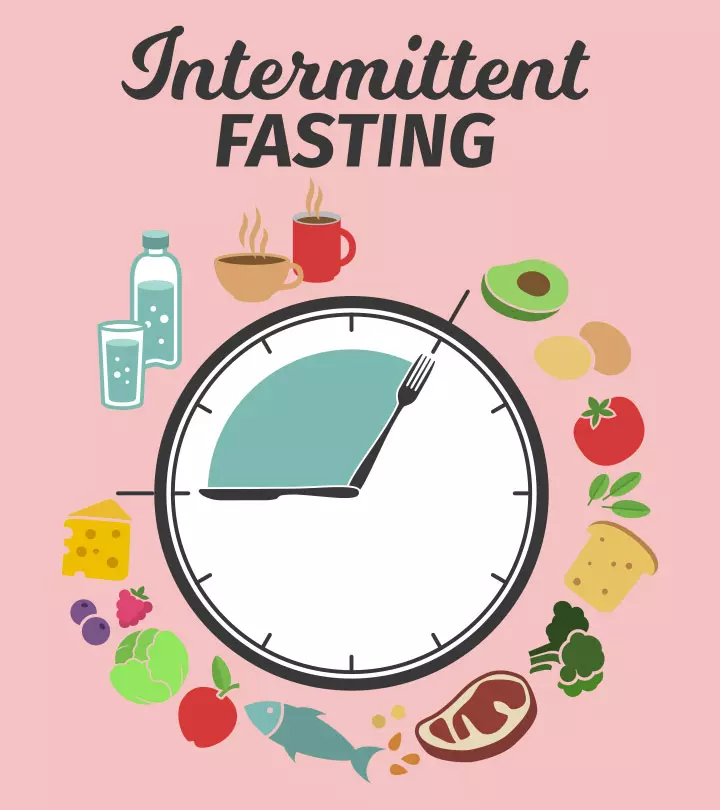


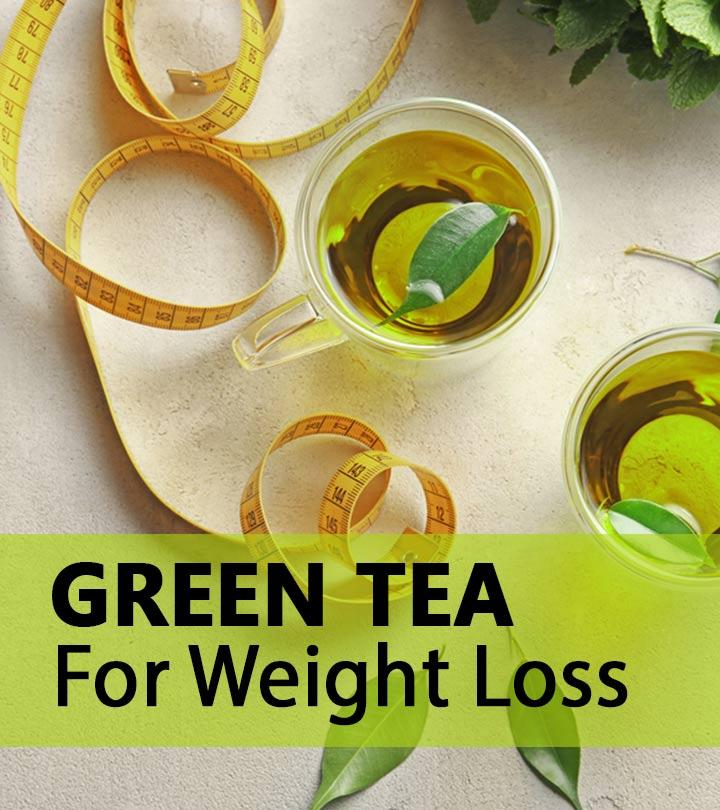
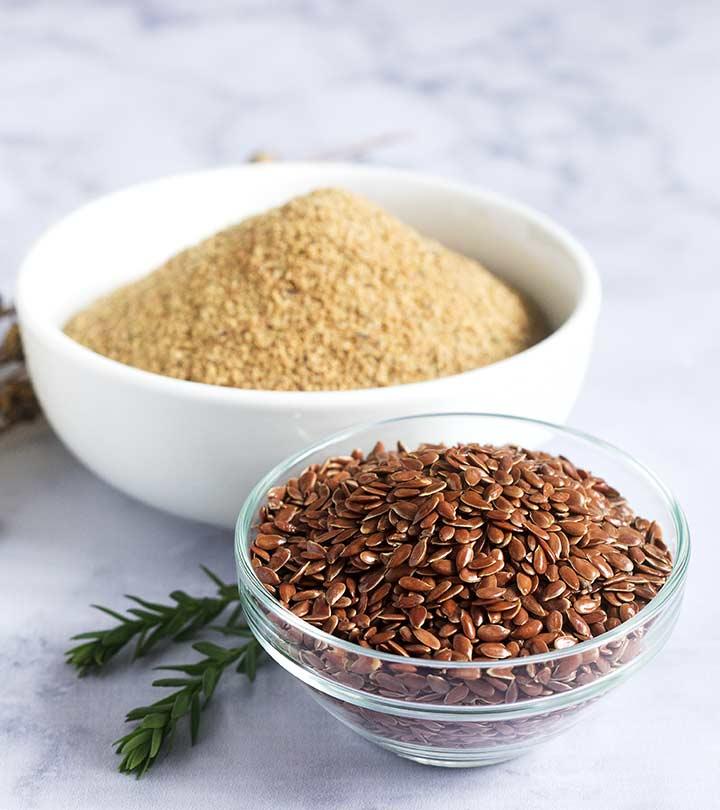




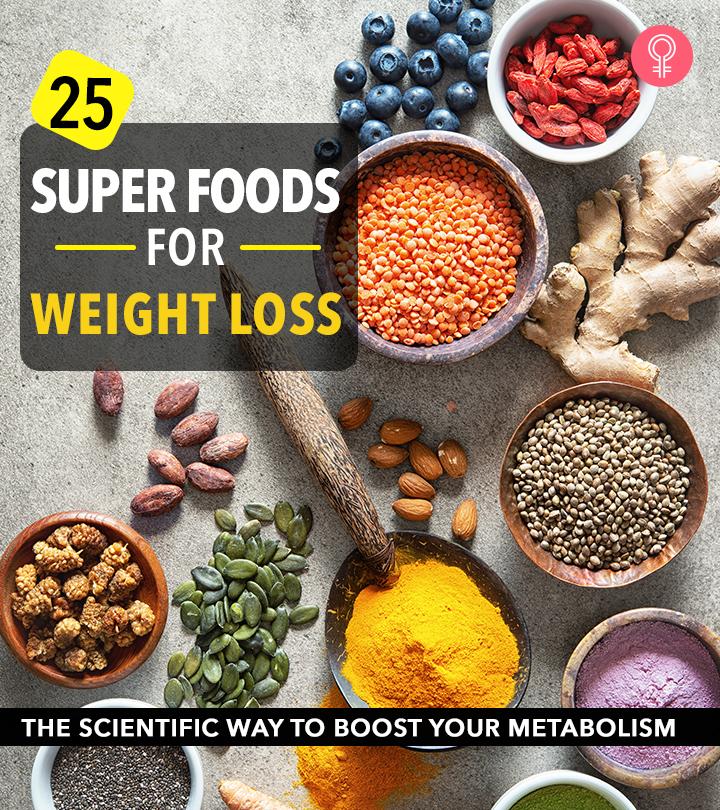



Community Experiences
Join the conversation and become a part of our empowering community! Share your stories, experiences, and insights to connect with other beauty, lifestyle, and health enthusiasts.